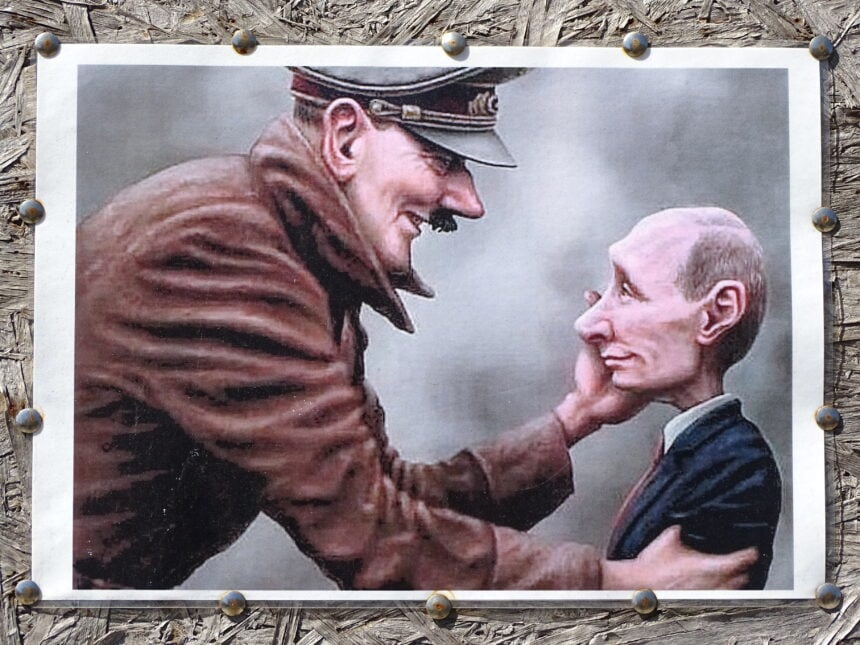Senator Lindsey Graham’s recent comments about wishing to see someone assassinate Putin, just as he wished Hitler had been taken out, reminded me of why I would never want neoconservatives like Graham running American foreign policy. And I don’t regard Graham’s remarks as an isolated opinion. I’ve heard numerous Republicans and Fox News celebrities seconding what he said and repeating his sentiment that Putin should be treated the way Hitler deserved to be treated. When stumbling-Joe made a statement in Warsaw about the need to remove Putin from power, Fox News dignitaries were falling all over each other to express impassioned agreement.
In these outbursts of malicious enthusiasm or enthusiastic malice, one discerns two neocon obsessions that have been characteristic of the conservative establishment since the 1980s. One of these fixations is the Eternal Hitler, who is always lurking in the antidemocratic corner. This deathless knave, who has arrived in an updated form, is eager to reenact all the evil carried out by his earlier incarnation, including mass extermination of people who are considered to be inherently inferior. But the sempiternal Hitler must fight the equally eternal Churchill, who will emerge, as he most recently has in the form of Volodymyr Zelensky, to combat absolute Hitlerian evil. This inevitable confrontation occurs each time “the democracies” let down their guard.
There are also appeasers in this narrative, and they are made to resemble a caricature of the hapless Neville Chamberlain, who tried to cut a deal with Hitler in Munich in September 1938. Please note that Chamberlain, who was ill with cancer at the time of this fateful meeting, didn’t think that British armies were ready to fight Hitler’s Germany. But he did declare war against that power when it invaded Poland on Sep. 1, 1939. Of course, the details in this legend don’t matter. What is important for the neocon view is dredging up questionable historical analogies and imposing them on changing historical circumstances.
It is possible to recognize that Putin is the aggressor in Ukraine and that Ukrainians may be fighting for their survival as a nation. But that doesn’t make Putin into the most recent advent of an eternal Hitler, as opposed to a conventional Russian expansionist who is helping himself to territory that the Russian empire controlled until the fall of the Soviet Union. Putin also appears to have a regrettable habit of poisoning his critics, but so did Renaissance princes and previous Russian despots, who, from what I can tell, were not predecessors of the German tyrant of the 1930s and 1940s. Moreover, the struggle against Hitler was won not only by “the democracies” (meaning England and the U.S.) but also with the help of one of the most murderous totalitarian regimes in human history, Stalin’s Soviet Union.
Historian Sean McMeekin has just published a monumental tome on how Stalin acquired the most booty and territory among those who waged a crusade against Nazism. Isn’t it possible to recognize someone as a just enemy (hostum justum), a question that Carl Schmitt presciently asked, without treating such an enemy as the worst evil who ever bestrode this planet? Although this hyperbolic tendency seems to be a really questionable way to conduct foreign policy, it may be an ineradicable habit of mind among our neocon-neoliberal ruling class.
The other problem with depicting Putin as a tyrant whom we must remove by force before he exterminates millions of people and tries to conquer the world is that it prevents diplomacy from taking place. It commits the U.S. and other “democracies” (i.e., those countries that accept neocon values) to a perpetual crusade against an imagined absolute evil. These “crusader states,” as Walter McDougall points out, do not conduct international relations in a world with different forms of government. They are ideological imperialists who are trying to make everyone whatever they are. Although the “antidemocrats” might make occasional trouble by invading other countries, the democratic globalists are perpetually picking a fight with anyone who rejects their ideology. They have an imaginary grid of the political world in which the binary choice is between having a “democracy” and being a dehumanizing tyranny.
In reality, most of the human race, including the Western world, have not lived in a state-of-the-art modern democracy. Even the U.S. in an earlier time was much less of a “democracy” in the current sense than it is now. When we speak about “democracy,” we are privileging a model of government that is relatively recent. An earlier “democratic” America did not allow for female suffrage and even practiced slavery until the second half of the 19th century. Such a republic would be marked for regime change under the present standards of democracy and would probably have to accept gay marriage as a precondition for winning moral and political acceptance among the neocon democrats. This overbearing, absolutist mentality does not seem to be a useful basis for developing relations and making treaties with other sovereign states. Instead, it imposes its own religious test act in the form of a grotesque ideological imperialism.
